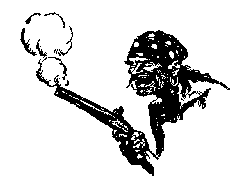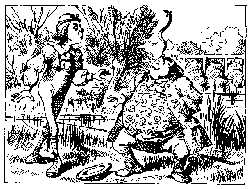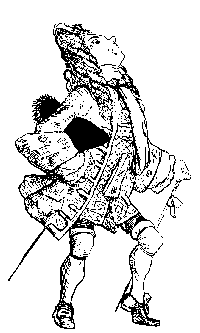BB, Feedback, Martha Stewart Comes Unglued, Going Galleywest, How to Spot a Nebbish, and Dressing to the Nines.
Aw, Mom, She's Exaggerating. It's Only a Flesh Wound.
 Dear Evan: I love my American Heritage Dictionary, but I sometimes wonder about the
bozos they have doing their etymological research for them. Under "B.B." they write "origin
unknown." I assume you know it stands for "ball bearing." I hope the newer editions get it right
someday. -- James A. Murray, via the internet.
Dear Evan: I love my American Heritage Dictionary, but I sometimes wonder about the
bozos they have doing their etymological research for them. Under "B.B." they write "origin
unknown." I assume you know it stands for "ball bearing." I hope the newer editions get it right
someday. -- James A. Murray, via the internet.
Well, to paraphrase Groucho Marx, I love my American Heritage Dictionary too, but
sometimes I leave it on the shelf. It's a great dictionary, no doubt about it. But every so often I'll
be
browsing through the Third Edition of the AHD and come across a bit of politically-correct idiocy
such as "ad feminam" (an artificial, annoying and utterly unnecessary "alternative" to "ad hominem"), and feel a
sudden
urge to throw the whole book out the window. I like to think that my father, who edited the first edition
of
the American Heritage in 1969, would have given that sort of nonsense short shrift.
In this case, however, I think you may be jumping the gun in your ire. The reason that the
AHD didn't mention that "BB" comes from "ball bearing" is that it doesn't. What we know as the
"BB" began life as a size of shot. "Shot," for you peaceful types out there, are the little pellets
inside
shotgun shells, and the size of shot used varies according to the type of critter the fearless hunter
plans
to expunge. According to the Dictionary of American English, a "BB" is so named because it falls
midway in size between "B" shot and "BBB" shot. At some point a
clever
inventor decided to use the BB shot as a single projectile in its own right, thus inventing the BB
gun
and enabling millions of children to perforate their siblings.
I have checked, incidentally, both the first and third editions of The American Heritage
Dictionary, neither of which says "origin unknown," so I suspect you may be looking in the
Second
Edition of the AHD. If so, I'd strongly suggest buying the Third Edition, which, even with its
occasional lapses, is a far better dictionary than the Second Edition.
Open the Hanger....
Dear Evan: As a student of the academic discipline that developed television
and fast-food drive-thru intercoms, I am very sensitive to the criticism that electrical engineers
contribute nothing of value to our culture. Would you please comment on the word "feedback"
and
mention what role, if any, my collegues have had in its history? -- Cliff Bowman, via the internet.
Well, I hate to be the one to break it to you, but "feedback" actually comes from the field of
pediatric psychology, and was invented to describe the consequences of attempting to feed
strained
peas to a recalcitrant infant. The only term in common usage I know of that originated in the field
of
electrical engineering is "warranty."
 Oh, all right, I was just funnin' you. Yes, the term "feedback" does indeed come from the field
of electrical engineering, and a remarkably useful word it has turned out to be, too. According to
the
Oxford English Dictionary, the original meaning, circa 1920, is "The return of a fraction of the
output
signal from ... a circuit, amplifier, etc., to the input of the same...." This form of feedback, often
consisting of an unpleasant shrieking sound, is familiar to almost anyone who has encountered a
public address system, and has served as the foundation of several rock groups' careers.
Oh, all right, I was just funnin' you. Yes, the term "feedback" does indeed come from the field
of electrical engineering, and a remarkably useful word it has turned out to be, too. According to
the
Oxford English Dictionary, the original meaning, circa 1920, is "The return of a fraction of the
output
signal from ... a circuit, amplifier, etc., to the input of the same...." This form of feedback, often
consisting of an unpleasant shrieking sound, is familiar to almost anyone who has encountered a
public address system, and has served as the foundation of several rock groups' careers.
The general concept of "feedback," a system reacting to its own "output," has since proven to
be an attractive metaphor for all sorts of un-electrical phenomena. While "biofeedback," the
technique
of monitoring bodily processes as a means of controlling them, is closely analogous to the
electrical
process, the term "feedback" has also come to be used as a simple synonym for "reaction." Today
we
are beseiged by politicians, magazines, television shows and even the Internal Revenue Service
imploring us to send them our "feedback." Golly, I hope the folks at the IRS enjoy the Neil
Young
record I sent them this year.
It's a Good Thing, Sortof.
Dear Evan: I was watching Martha Stewart on television last week, and she had a potter on as
a guest. While he was making a pot, he explained that the word "fettle" (as found in the phrase
"in
fine fettle") actually came from the craft of pot-making. Is this correct? -- Edith Freedle, New
York,
NY.
Ah, Martha Stewart. For those readers as yet unfamiliar with Ms. Stewart's oeuvre (a fancy
French word for "shtick"), she is the indefatigably chirpy host of a popular television homemaking
show. A sort of Hints from Heloise on steroids, her show instructs her viewers on the finer points
of
everything from making lovely doilies out of old inner tubes to building a replica of the Eiffel
Tower
composed entirely of cheesecake. Everything Martha does, of course, is done BY HAND, FROM SCRATCH,
and PERFECTLY. The charm of this sort of thing eludes me and seems to have a rather short shelf life
even among her fans. I know several women who started out idolizing Martha Stewart and ended
up
pawing through the Yellow Pages looking for a hit man willing to whack her in mid-doily.
Everything Martha does, of course, is done BY HAND, FROM SCRATCH,
and PERFECTLY. The charm of this sort of thing eludes me and seems to have a rather short shelf life
even among her fans. I know several women who started out idolizing Martha Stewart and ended
up
pawing through the Yellow Pages looking for a hit man willing to whack her in mid-doily.
In this case, Ms. Stewart (or, to be fair, her guest) has concocted a
Twinkie of a word origin. There does seem to be a remote connection between "fettle" and
pot-making, but the word definitely did not "come from" his craft. "Fettle," meaning "shape or
condition,"
comes from the Middle English word "fettlen," meaning "to make ready." The phrase "in fine
fettle"
thus quite logically means "in fine condition." The ultimate root of "fettle" seems to be the Old
English word "fetel," or belt, probably based on the notion of tightening one's belt in preparation
for a
task.
"Fettle" can also, as a verb, mean to tidy up an object that has been fired in a kiln, or, I
suppose, a pot that has been "thrown" on a potter's wheel, and this is probably the sense Martha's
guest
meant. But this is, as I said, a distinctly secondary meaning, and not where "in fine fettle" came
from.
So much for making your own word origins.
Say what?
Dear Evan: My late father was in the habit of using certain expressions that repeatedly
cropped up in his conversation. He would speak of somebody being "knocked galleywest," that
is,
struck or thrown violently with great risk of pulverizing his dignity, and perhaps something worse.
Which direction is "galleywest," or is it indeed a direction? -- Wallace Riley, via the internet.
 Before I tackle your question, here's a little glimpse into a situation I sometimes face in writing
this column. A reader sends me a query about a word or phrase his or her father, mother or
favorite
aunt used every day while the reader was a child, and asks where it comes from. I scour every
dictionary I own, including some fairly obscure dialect collections, but come up empty. I am then
faced with the prospect of informing the reader that the beloved relative was either (a) very
creatively
making up his or her own words, or (b) an immigrant from Pluto. I usually opt for (a), though I
often
suspect (b).
Before I tackle your question, here's a little glimpse into a situation I sometimes face in writing
this column. A reader sends me a query about a word or phrase his or her father, mother or
favorite
aunt used every day while the reader was a child, and asks where it comes from. I scour every
dictionary I own, including some fairly obscure dialect collections, but come up empty. I am then
faced with the prospect of informing the reader that the beloved relative was either (a) very
creatively
making up his or her own words, or (b) an immigrant from Pluto. I usually opt for (a), though I
often
suspect (b).
In this case, however, I am pleased to report that your father was using a word that not only
exists, but one whose history is fairly well documented. "Galley-west," according to the Random
House Historical Dictionary of American Slang, means "awry" or "askew," and is most often
found in
the form your father knew, "to knock galley-west," meaning to "knock askew, down, over, or to
pieces." Figurative uses include "to astonish" and "to surpass." Mark Twain was a great fan of
knocking things galley-west in his writings, including this vivid passage from Huckleberry Finn:
"Then she grabbed up the basket and slammed it across the house and knocked the cat
galley-west."
To "knock galley-west" is evidently an Americanism dating to the early 1800s, but don't go
looking for a "galley" to explain the phrase. "Galley-west" is an alteration of a very old English
dialect expression, "colly-west," meaning "awry, contradictory, or in the wrong direction,"
derived
from the name of Collyweston, a village in Northampshire, England. It's not clear what the
inhabitants
of the little village of Collyweston did to deserve being immortalized in "galley-west," but there
you
have it.
An Order of Milk Toast to Go, Please, Sir.
Dear Evan: I would be extremely grateful and relieved if you could supply me with
the meaning of the word (noun) "Nebbish." Thanks in advance. -- Gary Ewart, via the internet
 Relieved? Hmm -- I do hope I'm not stepping into the middle of some sort of social
confrontation by answering your question. Perhaps someone has referred to you as a "nebbish,"
and
you're looking for confirmation of the insult before you dispatch your minions to impede the
maledictor's well-being? I certainly hope not -- but then again, if you really are a nebbish, I've
nothing
to worry about.
A "nebbish" is, in the words of Leo Rosten in his incomparable The Joys of Yiddish (Pocket
Books, 1968), "an innocuous, ineffectual, weak, helpless or hapless unfortunate. A Sad Sack. A
loser." "Nebbish" (which is an Anglicized pronunciation of the proper Yiddish word "nebech") is,
as
Rosten puts it, "one of the most distinctive Yiddish words; it describes a universal character type."
Nothing good ever happens to a nebbish, and the word itself can also be used as an interjection
expressing sympathy ("His wife, nebech, has to put up with him").
Relieved? Hmm -- I do hope I'm not stepping into the middle of some sort of social
confrontation by answering your question. Perhaps someone has referred to you as a "nebbish,"
and
you're looking for confirmation of the insult before you dispatch your minions to impede the
maledictor's well-being? I certainly hope not -- but then again, if you really are a nebbish, I've
nothing
to worry about.
A "nebbish" is, in the words of Leo Rosten in his incomparable The Joys of Yiddish (Pocket
Books, 1968), "an innocuous, ineffectual, weak, helpless or hapless unfortunate. A Sad Sack. A
loser." "Nebbish" (which is an Anglicized pronunciation of the proper Yiddish word "nebech") is,
as
Rosten puts it, "one of the most distinctive Yiddish words; it describes a universal character type."
Nothing good ever happens to a nebbish, and the word itself can also be used as an interjection
expressing sympathy ("His wife, nebech, has to put up with him").
"Nebbish" is closely related to another Yiddish word for one of life's unfortunates, "schlemiel"
(rhymes with "reveal"), but a schlemiel (a simpleton or misfit) can be disliked, while a nebbish
must
be pitied. A nebbish, notes Rosten, is sometimes defined as the person who picks up what the
schlemiel knocks over.
Nebbishes, as one might imagine, are the butt of countless jokes, among them this one related
by Rosten: A seventh-grader was so late coming home from his suburban school that his mother
was
frantic. "What happened to you?" she cried. "I was made traffic guard today, Mamma, and all
the
kids have to wait for my signal, after I stop a car, before they cross the street." "But you were
due
home two hours ago!" "Mamma, you'd be surprised how long I had to wait for a car to come
along I
could stop!"
And, Of Course, My Official Word Detective Beanie ($12.95 postpaid).
Dear Evan: Any idea where and why the phrase "dressed to the nines" originated? -- We're
signed "dressed to the threes." -- Jack Swaim, via the internet.
 Well, at least you're dressed. It dawned on me recently that the average reader has a
completely erroneous idea of the "lifestyle" of a writer. We're pictured hobnobbing with socialites
at
fancy parties, or boozing it up at crowded bars, or lunching at expensive restaurants. None of this
is
true. We spend ninety-nine percent of our time sitting at home, and being a writer means, first
and
foremost, never having to get dressed, period. I am writing this particular column clad only in
swimming trunks and combat boots.
Well, at least you're dressed. It dawned on me recently that the average reader has a
completely erroneous idea of the "lifestyle" of a writer. We're pictured hobnobbing with socialites
at
fancy parties, or boozing it up at crowded bars, or lunching at expensive restaurants. None of this
is
true. We spend ninety-nine percent of our time sitting at home, and being a writer means, first
and
foremost, never having to get dressed, period. I am writing this particular column clad only in
swimming trunks and combat boots.
There is, on the other hand, an entire wardrobe full of possible origins of "dressed to the
nines," meaning to be dressed in an elegant or elaborate fashion. One theory is that it came from
an
Old English saying "dressed to the eyes," or to please the beholder. In the peculiar spelling of Old
English, this would have been rendered "dressed to then eyne." Through a process called
"metanalysis," in which letters from one word migrate over time to a neighboring word, "then
eyne"
might have become "the neyne" and then "the nines." A similar process transformed "a napron"
(related to "napkin") to our modern "an apron."
Another theory notes that, since the number nine holds an exalted place in numerology, "the
nines" might have been adopted in the distant past as a synonym for "superlative." It's also
possible
that the phrase came from an old jeweler's phrase, "nine nines fine," referring to gold of
99.9999999
percent purity, or that the phrase refers to the nine muses of classical mythology, or to the spiffy
uniforms of the 99th Wiltshire Regiment in England, or, well, you get the idea. There is no one
answer, so I guess you'll just have to pick the one you like best.
Back to main page
 Dear Evan: I love my American Heritage Dictionary, but I sometimes wonder about the
bozos they have doing their etymological research for them. Under "B.B." they write "origin
unknown." I assume you know it stands for "ball bearing." I hope the newer editions get it right
someday. -- James A. Murray, via the internet.
Dear Evan: I love my American Heritage Dictionary, but I sometimes wonder about the
bozos they have doing their etymological research for them. Under "B.B." they write "origin
unknown." I assume you know it stands for "ball bearing." I hope the newer editions get it right
someday. -- James A. Murray, via the internet. Oh, all right, I was just funnin' you. Yes, the term "feedback" does indeed come from the field
of electrical engineering, and a remarkably useful word it has turned out to be, too. According to
the
Oxford English Dictionary, the original meaning, circa 1920, is "The return of a fraction of the
output
signal from ... a circuit, amplifier, etc., to the input of the same...." This form of feedback, often
consisting of an unpleasant shrieking sound, is familiar to almost anyone who has encountered a
public address system, and has served as the foundation of several rock groups' careers.
Oh, all right, I was just funnin' you. Yes, the term "feedback" does indeed come from the field
of electrical engineering, and a remarkably useful word it has turned out to be, too. According to
the
Oxford English Dictionary, the original meaning, circa 1920, is "The return of a fraction of the
output
signal from ... a circuit, amplifier, etc., to the input of the same...." This form of feedback, often
consisting of an unpleasant shrieking sound, is familiar to almost anyone who has encountered a
public address system, and has served as the foundation of several rock groups' careers. Everything Martha does, of course, is done BY HAND, FROM SCRATCH,
and PERFECTLY. The charm of this sort of thing eludes me and seems to have a rather short shelf life
even among her fans. I know several women who started out idolizing Martha Stewart and ended
up
pawing through the Yellow Pages looking for a hit man willing to whack her in mid-doily.
Everything Martha does, of course, is done BY HAND, FROM SCRATCH,
and PERFECTLY. The charm of this sort of thing eludes me and seems to have a rather short shelf life
even among her fans. I know several women who started out idolizing Martha Stewart and ended
up
pawing through the Yellow Pages looking for a hit man willing to whack her in mid-doily. Before I tackle your question, here's a little glimpse into a situation I sometimes face in writing
this column. A reader sends me a query about a word or phrase his or her father, mother or
favorite
aunt used every day while the reader was a child, and asks where it comes from. I scour every
dictionary I own, including some fairly obscure dialect collections, but come up empty. I am then
faced with the prospect of informing the reader that the beloved relative was either (a) very
creatively
making up his or her own words, or (b) an immigrant from Pluto. I usually opt for (a), though I
often
suspect (b).
Before I tackle your question, here's a little glimpse into a situation I sometimes face in writing
this column. A reader sends me a query about a word or phrase his or her father, mother or
favorite
aunt used every day while the reader was a child, and asks where it comes from. I scour every
dictionary I own, including some fairly obscure dialect collections, but come up empty. I am then
faced with the prospect of informing the reader that the beloved relative was either (a) very
creatively
making up his or her own words, or (b) an immigrant from Pluto. I usually opt for (a), though I
often
suspect (b). Relieved? Hmm -- I do hope I'm not stepping into the middle of some sort of social
confrontation by answering your question. Perhaps someone has referred to you as a "nebbish,"
and
you're looking for confirmation of the insult before you dispatch your minions to impede the
maledictor's well-being? I certainly hope not -- but then again, if you really are a nebbish, I've
nothing
to worry about.
A "nebbish" is, in the words of Leo Rosten in his incomparable The Joys of Yiddish (Pocket
Books, 1968), "an innocuous, ineffectual, weak, helpless or hapless unfortunate. A Sad Sack. A
loser." "Nebbish" (which is an Anglicized pronunciation of the proper Yiddish word "nebech") is,
as
Rosten puts it, "one of the most distinctive Yiddish words; it describes a universal character type."
Nothing good ever happens to a nebbish, and the word itself can also be used as an interjection
expressing sympathy ("His wife, nebech, has to put up with him").
Relieved? Hmm -- I do hope I'm not stepping into the middle of some sort of social
confrontation by answering your question. Perhaps someone has referred to you as a "nebbish,"
and
you're looking for confirmation of the insult before you dispatch your minions to impede the
maledictor's well-being? I certainly hope not -- but then again, if you really are a nebbish, I've
nothing
to worry about.
A "nebbish" is, in the words of Leo Rosten in his incomparable The Joys of Yiddish (Pocket
Books, 1968), "an innocuous, ineffectual, weak, helpless or hapless unfortunate. A Sad Sack. A
loser." "Nebbish" (which is an Anglicized pronunciation of the proper Yiddish word "nebech") is,
as
Rosten puts it, "one of the most distinctive Yiddish words; it describes a universal character type."
Nothing good ever happens to a nebbish, and the word itself can also be used as an interjection
expressing sympathy ("His wife, nebech, has to put up with him"). Well, at least you're dressed. It dawned on me recently that the average reader has a
completely erroneous idea of the "lifestyle" of a writer. We're pictured hobnobbing with socialites
at
fancy parties, or boozing it up at crowded bars, or lunching at expensive restaurants. None of this
is
true. We spend ninety-nine percent of our time sitting at home, and being a writer means, first
and
foremost, never having to get dressed, period. I am writing this particular column clad only in
swimming trunks and combat boots.
Well, at least you're dressed. It dawned on me recently that the average reader has a
completely erroneous idea of the "lifestyle" of a writer. We're pictured hobnobbing with socialites
at
fancy parties, or boozing it up at crowded bars, or lunching at expensive restaurants. None of this
is
true. We spend ninety-nine percent of our time sitting at home, and being a writer means, first
and
foremost, never having to get dressed, period. I am writing this particular column clad only in
swimming trunks and combat boots.